Out & About: 7 Great Quotes From Converge in Carlsbad
At Converge 2025, Editor-in-Chief Michelle Graff attended sessions on DEI, tariffs, security, and more. Here are her top takeaways.

Conclave is one of my favorite events on the jewelry industry calendar, and this new take on it did not disappoint. The sessions were engaging, the weather was perfect, and the setting was gorgeous.
Over the course of the three-day event, I attended sessions on diversity, equity, and inclusion; cybercrime; in-store crime; and tariffs, and heard from a renowned neuroscientist.
Here are my favorites quotes from all each of them.
On Diversity, Equity, and Inclusion
“DEI is not a dirty word. It’s not politics; it’s people.”
— Jeffery Bolling, Jeffery B. Jewelers
Bolling’s breakout session on diversity, equity, and inclusion was the first session I attended at Converge and it ended up being one of the best.
In his presentation, “DEI as a Competitive Advantage: Thriving in Today’s Market,” Bolling talked about how having a diverse staff can help companies and brands reach more potential customers, break into new markets, attract and retain top talent, and create an inclusive environment where everybody feels comfortable sharing ideas.
Having a more diverse staff also can prevent companies and brands from putting out tone-deaf ads that alienate certain audiences, and later having to pull those ads and apologize. (Please see: Pepsi’s ill-conceived commercial from 2017 featuring Kendall Jenner, the 2018 backlash over H&M’s green hooded monkey sweatshirt, and, just last month, the “slanted eyes” ad Swatch had to pull after an uproar on social media in China.)
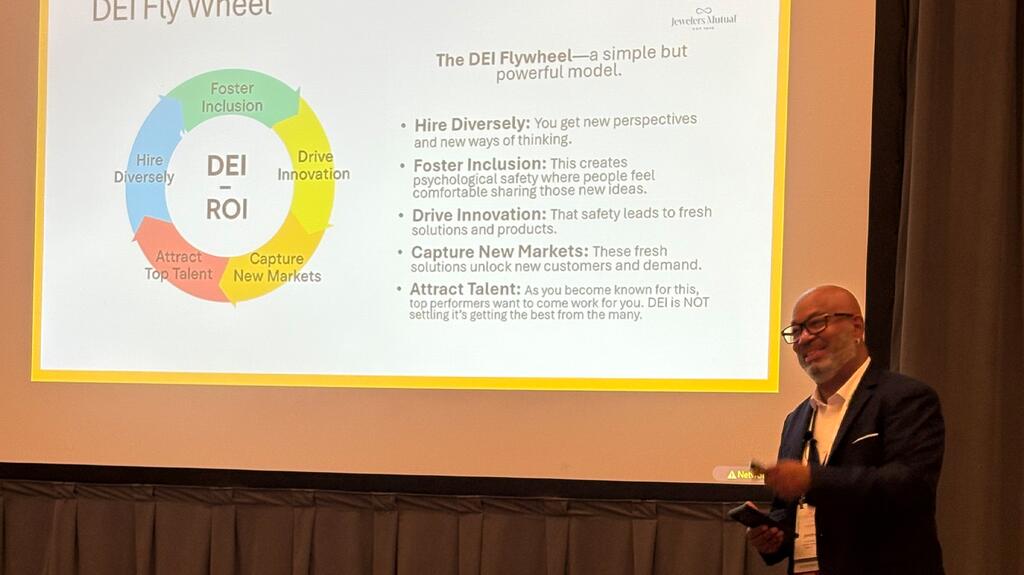
Bolling, a Black man, also shared a difficult but, unfortunately for so many, relatable story about how early on in his career, a woman came into the jewelry store where he was working and told him he was an “affirmative action hire.”
She then proceeded to have him follow her from showcase to showcase while she berated him over his lack of product knowledge.
While she was wrong on so many levels, Bolling acknowledged she was right about one thing—he didn’t know enough about watches and jewelry.
The incident pushed him to learn everything he could about diamonds, gemstones, and watches, which is what makes him the knowledgeable and successful jeweler he is today.
As for that extremely impolite customer? Bolling never saw her again, but he was looking for her.
“I was always waiting on that lady to show up so I could show her that I deserved to be here,” he said.
On the Beauty of Being Deficient
“A seed is a complete seed but a deficient tree. What’s beautiful about the seed is its possibility to evolve into the tree. If we weren’t deficient, we could never evolve. Deficiency is an amazing, beautiful thing.
“We’re always a complete seed at any moment in time, but part of being complete is our possibility to become. And life is always about becoming; it’s never about reaching a destination. We’re always becoming, and we couldn’t become if we don’t, in some sense, have a space in which to become.”
— Beau Lotto, author and professor of neuroscience
I missed Lotto’s opening keynote at Converge, which is a shame because I enjoy bubbles, but I did catch the afternoon breakout session he did with Jewelers Mutual Group’s Mark Smelzer.
In the session, titled “Dr. Beau Lotto: A Deeper Conversation,” Lotto talked one-on-one with Smelzer about adapting to change and thriving in uncertainty, and the importance of meditation and being in nature, which is “fundamental to our brains,” he said.
He also asked the audience what business they were in; one audience member said hospitality, while another said love, both good answers.
For me, the high point of the discussion came at the end of the session, when Lotto talked about the beauty of imperfection, something many of us need to broaden our perspectives on when it comes to both gemstones and life.
On Not Feeling Targeted by Tariffs
“Every industry is dealing with this. This is not directed at the jewelry industry or any other specific industry. All industries are dealing with this issue. When we talk about what’s going on in the tariff landscape, you have to keep that in mind. I think sometimes we feel really targeted, but it’s actually not about us.”
— Sara Yood, Jewelers Vigilance Committee
In my mind, tariffs and lab-grown diamonds tied for the title of Hottest Topic at Converge 2025, so it’s no surprise Yood’s informative session, “Gold, Gems, and Global Headwinds: Trade and Tariffs in Focus,” was packed.
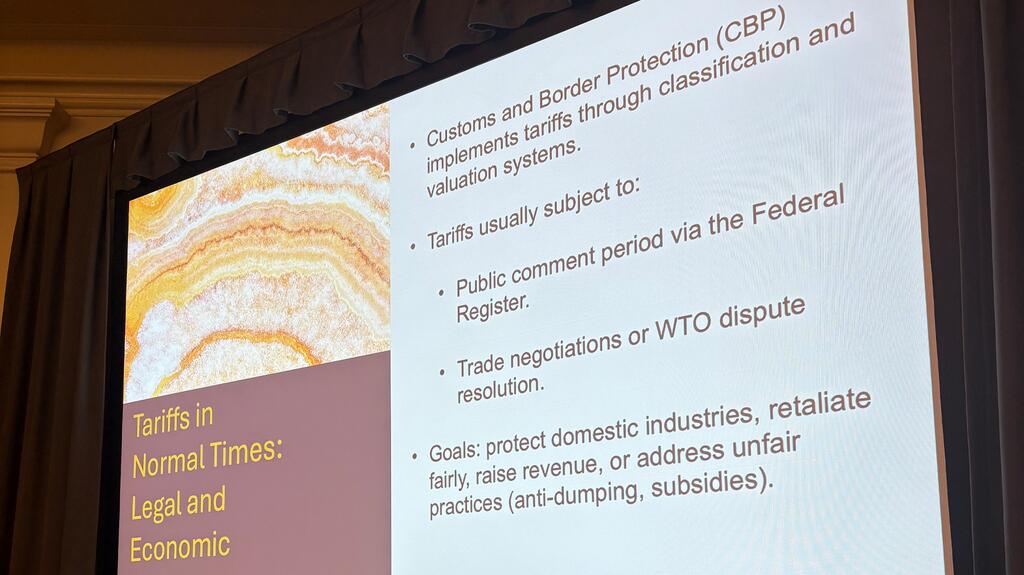
In it, she traced the history of tariffs from 1789—when the U.S. first employed them to raise money to pay off Revolutionary War debt—to the Smoot-Hawley Tariff Act of 1930. The bill was intended to pull the country out of the Great Depression but, as everyone who has seen “Ferris Bueller’s Day Off” knows, it did not work.
Yood also covered the latest development in the ongoing tale of the tariffs.
On Sept. 5, President Donald Trump issued a new executive order on tariffs that added certain categories of gold, mainly investment products and raw gold, to the list of items that are tariff free.
The order also included a new annex, which lists certain categories of natural resources that may be exempt from tariffs if they are imported from countries that reach a trade deal with the United States.
Unset (loose) diamonds, colored gemstones, platinum group metals, and natural pearls are on the list; cultured pearls and lab-grown diamonds are not.
But, again, these items will be exempt only if the country exporting them signs a trade deal with the United States. For some countries—including India (50 percent tariff rate)—it does not seem an agreement will be reached any time in the near future.
So, how and why did this happen?
During the session, Yood explained.
“As you know, there have been a lot of lobbying efforts in every industry, but also within the jewelry industry, and we are very grateful to JA and AGTA and WDC for doing all that work,” she said.
“One of the things they have all been [explaining to lawmakers] is, we need raw materials to make jewelry in the United States, which seems like a thing you want, but we can’t make that if we can’t afford the goods.”
She added, “There have been a lot of industries that have been going to the White House, they’ve been going to Congress, trying to make sure they understand why this is causing such a huge headache for the industry.”
And they’ll continue to go.
Tariffs will be the top issue when Jewelers of America does its annual fly-in to Washington, D.C., later this month. In addition, JA will host a webinar Sept. 22 at 2 p.m. EDT titled “Fighting Tariffs on Capitol Hill.”
The organization also has a Legislative Action Center where members of the industry can reach out to their representatives in Congress and let them know how tariffs are affecting their business.
On Using (or Not Using) Your Gun
“It’s imperative that you be a good witness. You’re going to miss, but the bad person isn’t going to miss, unfortunately, and the stats back me up on that.”
— Steve Gonzalez, FBI (ret.)
I attended two crime/security-focused sessions at Converge and there was plenty to take away from both (see cybersecurity section below).
The frankest security conversation of Converge took place Tuesday during “Cracking the Code: Protecting the Jewelry Industry from Physical & Cyber Threats.”
At one point, the discussion turned to possessing and using firearms, and both Gonzalez—a retired FBI special agent—and fellow panelist Greg “Dutch” Holland-Merten—who served as a Royal Marines commando—advised jewelers not to pull out their gun and start shooting during a robbery.
It’s dangerous and is likely to escalate the situation, leading to potential bodily harm to the jeweler, store staff, customers, and bystanders.
As the Jewelers’ Security Alliance always advises, jewelers should comply with the robbers’ demands and get them out of the store as quickly as possible to minimize risk.
On Cybersecurity
“If [your system] takes too long to hack because you’ve done the basics well, then they’ll just move down the line to someone else.”
— Holland-Merten, HMH Security Consulting
This a Holland-Merten quote from the same cybersecurity session mentioned above, during which he also advised jewelers to double their cybersecurity insurance and to immediately report a ransomware attack to local and national authorities.
Holland-Merten said in Europe, ransomware attacks that involve the theft of personal data must be reported by law, but in the United States, the laws vary by state.
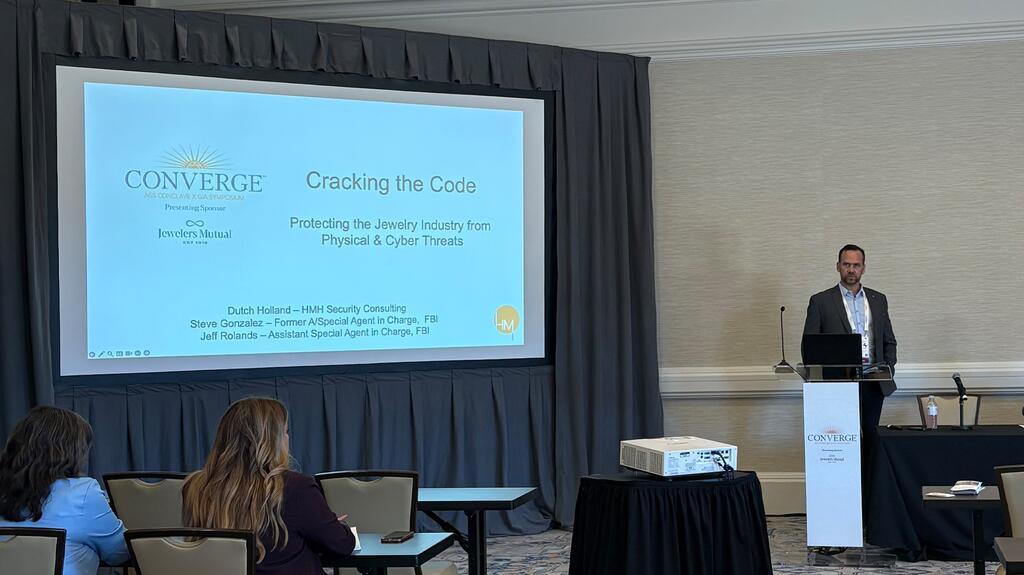
He recommends reporting such attacks nonetheless, noting that if a jeweler, for example, tried to make the problem quietly go away by paying ransom to an individual or organization that turns out to be on the terrorist watchlist, there would be consequences.
Ransomware attacks can be reported via the Internet Crime Complaint center and should include a police report, or at least a police report number.
On the Pitfalls of Oversharing
“I’ve seen a salesperson rattle off 7,000 things they know about this ring and the customer gets overwhelmed. Don’t be a robot spitting out facts.”
— Brandon Heller, Heller Jewelers
Heller was one of three jewelers who participated in a roundtable discussion led by Adam Graham of Josh J Fine Jewelry. Called “Selling Bigger Better,” the conversation focused on the art of selling higher-ticket items and of creating an environment that brings people in and makes them want to stay.
I loved this comment by Heller, which speaks to the dangers of getting caught up in product information instead of engaging in personal conversation with customers, e.g., asking them about their family or their cat. The latter would work on me every time.
One other takeaway—food and alcohol are solid bets for attracting customers.
On Why It’s Good to Do Good
“If we do right, it’s good for the next generation.”
— Shreyans Dholakia, Shree Ramkrishna Exports Pvt. Ltd. (SRK)
I wanted to wrap up my list of favorite Converge quotes on a high note, so I chose this one from Dholakia, the brand custodian of SRK.
Dholakia led a session titled “Sparkling Sustainability: How Natural Diamonds Are Shaping a Responsible World,” and discussed the laundry list of things SRK does to manufacture diamonds in an environmentally responsible way.
He also made an excellent point: Even if luxury consumers aren’t outright asking if the product they are buying was produced “responsibly,” they expect it to be.
It’s the brand’s responsibility to make sure they are meeting the consumer’s expectations, and it’s the retailer’s job to relay that information to the customer.
The Latest
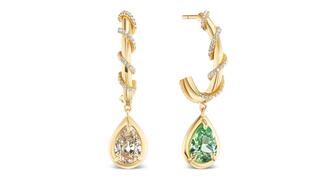
The trendy earrings feature asymmetrical drops, one with a grossular garnet and the other with a diamond.

Four social media marketing experts discuss their go-to methods and favorite tools for making high-quality short-form video content.
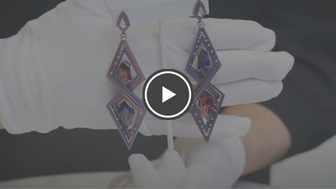
Sponsored by American Gem Trade Association
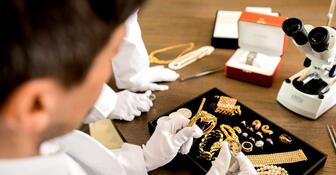
With their unmatched services and low fees, reDollar.com is challenging some big names in the online consignment world.

In its holiday report, PwC said the season will be more like jazz—improvisational and less predictable—than an easy-to-follow melody.


The jewelry giant will relocate its existing facility to a larger space in Anne Arundel.

The designer, who is the creative force behind her namesake brand, has now started a new mini line focusing on chains for fathers and sons.
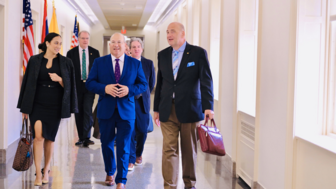
Jewelers of America is leading the charge to protect the industry amidst rising economic threats.

The awards include tuition for a course at the Swiss lab, economy flights, and hotel accommodation.
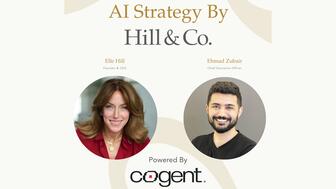
The 21-day program was designed to help jewelry retailers identify opportunities and eliminate inefficiencies with AI.
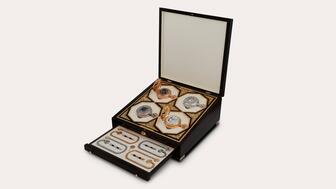
A set of four Patek Philippe “Star Caliber 2000” pocket watches is part of Sotheby’s upcoming auction in Abu Dhabi.
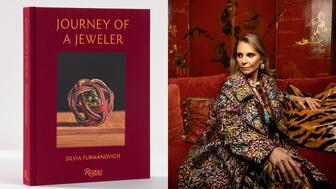
The Brazilian jeweler’s latest book marks her namesake brand’s 25th anniversary and tells the tale of her worldwide collaborations.
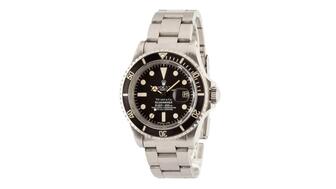
The Submariner Ref. 1680 with a Tiffany & Co. dial came from the original owner, who won it as a prize on the game show in the 1970s.

The new integration allows users to manage shipments directly from the Shopify dashboard.

Six people were shot last week at an Oakland cash-for-gold shop as employees exchanged gunfire with individuals trying to rob the store.

The jeweler has expanded its high jewelry offering, which launched last year, with new pieces featuring its cube motif that debuted in 1999.
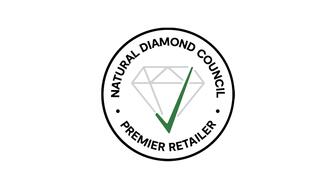
Ben Bridge Jeweler and Lux Bond & Green were a part of the pilot program.

It’s predicting a rise in retail sales this holiday season despite economic uncertainty and elevated inflation.

It included the sale of the 11,685-carat “Imboo” emerald that was recently discovered at Kagem.

The newly elected directors will officially take office in February 2026 and will be introduced at the organization’s membership meeting.
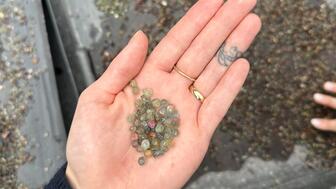
Associate Editor Lauren McLemore headed out West for a visit to Potentate Mining’s operation hosted by gemstone wholesaler Parlé Gems.
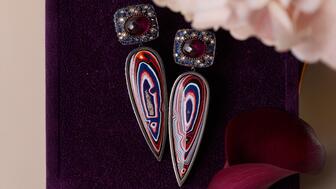
Fordite is a man-made material created from the layers of dried enamel paint that dripped onto the floors of automotive factories.
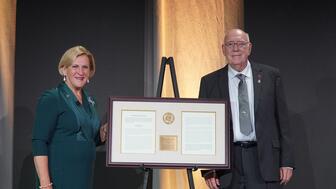
Gilbertson has worked as a researcher, jeweler, lapidary artist, appraiser, and business owner throughout his decades in the industry.

A decision likely won’t come until January 2026 at the earliest, and the tariffs remain in effect until then.

Located in the revamped jewelry hall at the retailer’s New York City flagship, this opening is Tabayer’s first shop-in-shop.

The new, free app offers accessible educational content, like games and podcasts, for U.S. retailers.

As the gold price rises, the manufacturer is offering a 100 percent payout through Sept. 30 for gold clean scrap.




























